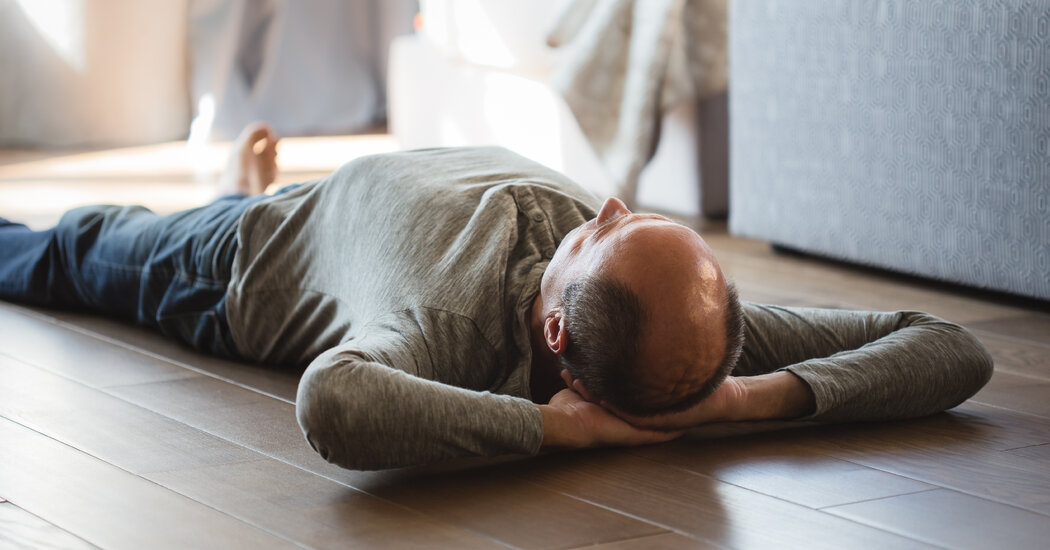As a child, Josh Patner became accustomed to stepping over his mom, who used to lie down in the kitchen whenever her mother-in-law would call.
“My grandmother would talk her ear off,” Mr. Patner, 61, recalled. To cope, his mother would “lie on the floor and hold the phone away from her head.” Mr. Patner’s father, also a fan of the floor, took a 20-minute nap under the family’s piano each night after work.
So it is unsurprising, perhaps, that Mr. Patner enjoys floor time at his home in Brooklyn or even at his friend’s places — in part to stretch and soothe his back (he has scoliosis), but also, he says, because it feels calming.
“If I know you well enough to sit on your couch, I know you well enough to lie on your floor,” he said.
While this is nothing new to Mr. Patner, others are just now catching on to the practice: Posts with the hashtag #floortime have garnered millions of views on TikTok.
Lily Bishop, a graduate student in Chicago, made a video showing herself prone on her beige carpet, silently staring at the ceiling, arms spread wide. “I am a floor person to my core,” read the words emblazoned over the clip. “Meeting just ended? Floor. Home from the gym? Floor. Want to take a nap? Floor.”
“I find it makes me more relaxed and present, and kind of, like, slows down the anxious thoughts,” Ms. Bishop, 27, said when reached by phone.
For her, the sensation feels similar to watching ocean waves wash ashore — but without the trip to the beach.
“You don’t have to have a serene, natural environment,” Ms. Bishop said. “You just need the floor.”
What’s so great about being on the floor?
Although there isn’t a body of research that extols the benefits of lying on the ground, psychologists say spending time on the floor is unlikely to hurt, and can even help us feel grounded.
When you lie flat on your back, your posture is open and relaxed, which may have a calming effect, said Ellen Hendriksen, a clinical psychologist in Boston.
“Your body and mood want to align,” she said. This is why it’s difficult to feel hopeful and optimistic if you’re slumped in your chair, head hanging down, she added. Or why our shoulders shoot up or our jaws clench when we’re anxious.
Lying on the ground might also help us avoid ruminating, explained Alan Fogel, a professor emeritus of psychology at the University of Utah and the author of “Restorative Embodiment and Resilience.”
“In our Western culture, we don’t have a lot of spaces for restoration,” Dr. Fogel said. “There’s no timeouts. There’s no recess.”
You may assume that a comfortable mattress would be more conducive to relaxation. “But typically what happens, especially in familiar places like our bed, is our mind keeps working,” Dr. Fogel said. “We think about what happened during the day. We think about what we could have done or should have done.”
When lying on a harder surface like the floor, however, you may become more attuned to what your body is feeling and less focused on your thoughts.
To get comfortable, it becomes necessary to sink into the floor and soften your muscles, Dr. Fogel added. The focus on letting go makes it easier to help the body and mind decompress — to “just be,” he said.
Kara Lennon, 34, an account executive and an indoor cycling instructor in Boston, has been a fan of floor time for about a decade.
“It’s like going outside and sitting in the sun” for a few minutes, she said. You feel better, “and then you can get back to whatever you’re doing.”
People have been gravitating to the ground for centuries. Examples include the yoga pose savasana, which helps people slowly relax each part of the body while lying on their backs; Zen meditation or tea ceremonies that often take place on the floor; and the radiant floor heating system in Korean homes, which makes the ground even more enticing for sleeping, studying or eating.
Is lying on the floor for you?
Not everyone will find relief on the floor. Some may have physical challenges, for instance, that make it uncomfortable or painful to lower themselves to the ground.
If you are able to try it and want to give floor time a go, “focus on your breath, really turn inward,” said Rachel Goldman, a psychologist and clinical assistant professor of psychiatry at the NYU Grossman School of Medicine. Do you feel more relaxed, more grounded or more in control? If so, she said, “it’s one additional strategy that you can use when you feel like you need to.”
Ms. Lennon acknowledged that “it might seem silly,” but in her case, taking a floor break for even just a few minutes each day allows her to be more productive while working from home.
“It’s pressing the reset button for a second,” she said.


